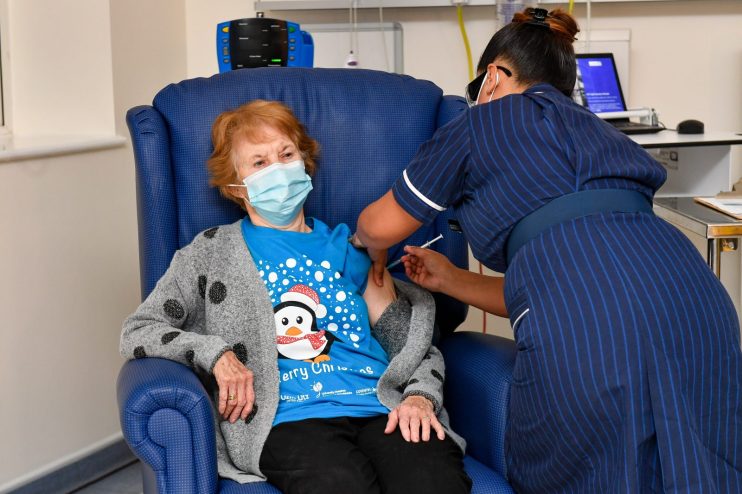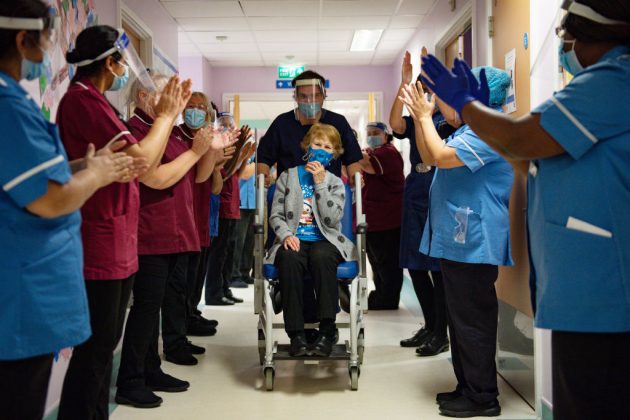V-Day: All your vaccine questions answered

Ninety-year-old Margaret Keenan this morning became the first person in the world to receive a coronavirus vaccine outside of a trial, marking the start of Britain’s largest vaccination programme in history.
Jabs of the Pfizer/Biontech vaccine will be administered at dozens of hospital hubs across the country from today, dubbed V-Day by health secretary Matt Hancock.
“If we manage to do that for everybody who is vulnerable to this disease, then we can move on and we can return to normal,” he said.
Who will get the vaccine?
Around 800,000 doses are expected to be available in the UK by the end of the week, with care home residents and carers, the over-80s and some health service workers at the front of the queue.
The government’s Joint Committee on Vaccination and Immunisation (JCVI) has set out its priority list for the first phase of Britain’s mass vaccine rollout.
The priority list for the first phase is as follows:
1 – Residents in a care home for older adults and their carers
2 – All those aged 80 and over. Frontline health and social care workers
3 – All those aged 75 and over
4 – All those aged 70 and over. Clinically extremely vulnerable individuals
5 – All those aged 65 and over
6 – All individuals aged 16-64 with underlying health conditions which put them at higher risk of serious disease and mortality
7 – All those aged 60 and over
8 – All those aged 55 and over
9 – All those aged 50 and over
But significant logistical challenges in distributing the vaccine, which only lasts five days in a regular fridge, mean it will first be sent out to hospitals that can safely store the drug at -70C.
Pregnant women and children under 16 will likely not receive the vaccine under phase one trials.

Where will the vaccine be available?
Hancock this morning set out the “three modes of delivery” of the vaccine. Hospitals will receive the vaccine first, followed by mass vaccination centres and GPs and pharmacists offering the jab to those most in need.
Around 70 hospitals are in line to receive the vaccine this week, after it arrived in the UK from Belgium on Thursday.
The hubs include London hospitals Guys & St Thomas, Kings College Hospital, the Royal Free, St George’s and UCLH.
However, the hospitals will not necessarily distribute vaccines to patients on site, but will be capable of storing the vaccines and coordinate their distribution.
The vaccine needs to be defrosted before it can be used, which takes several hours, and then additional time is needed to prepare the vaccine for being administered.
Is the vaccine compulsory?
The government has repeatedly stated that the vaccine will not be mandatory, but that the country’s chances of defeating the virus will depend on widespread uptake.
The NHS will soon roll out a vaccine media blitz attempting to boost public awareness of the safety of the Pfizer jab, with ministers drawing up a list of “sensible” celebrities to endorse the vaccine.
The campaign, understood to feature the slogan “The NHS needs you”, will draw on wartime imagery to increase uptake of the vaccine.
It comes amid concerns that anti-vaxxer misinformation may scupper the vaccination campaign.
A survey by market research company Kantar at the end of November found that 75 per cent of people in the UK were “likely” to accept a jab, but only 42 per cent said they would definitely do so, and “the hesitancy is growing”.
Medical experts have estimated that the UK will need at least 60 to 75 per cent uptake for Britain to defeat the coronavirus epidemic.
Chief medical officer Jonathan Van-Tam last week said: “I don’t think we’ll eradicate coronavirus ever, I think it’s going to be with humankind forever.” However, he added that he would “be first in line” to take the vaccine if he were eligible.
When will the UK be vaccinated?
The Pfizer/Biontech vaccine requires two doses to protect against coronavirus. The second dose is administered three weeks after the first, and then it takes a week to get full immunity, meaning Britain is still a month away from anyone being vaccinated.
“We’ve got to stick together because as of this morning, right now, several dozen people have been vaccinated and by Christmas several million people will have been vaccinated,” the health secretary said this morning.
The UK should have enough vaccine by the end of the year to give a first dose to everyone over the age of 75, as well as health and social care workers — roughly 10m people.
More doses are due to arrive in the UK from Belgium in January, allowing those who have had their first dose to have a second, boosting their immunity.
Speaking to the BBC this morning, NHS medical director Professor Stephen Powis said the vulnerable will likely be vaccinated by “March or early spring”.
After that, the UK will begin phase two trials, which will see the wider public immunised against coronavirus.
In total, Britain has ordered 40m doses of the Pfizer/BioNTech vaccine — enough to vaccinate 20m people in a country of 67m.
Health officials will turn to other vaccines on the horizon to complete the UK’s vaccination programme, including the Astrazeneca/University of Oxford vaccine, of which the government has ordered 100m doses, and the Moderna vaccine, which the UK is set to receive 7m doses of.
What next?
Hancock said today was “really emotional but also tinged with worry because we still got a few months ago now, and we’ve got to keep our resolve”.
Local restrictions and social distancing measures are likely to remain in place until phase one vaccinations have been completed in the spring, with the Prime Minister vowing to return Britain to normality “as soon as possible”.
“Because we’ve been able to get this vaccination programme going sooner anywhere else in the world, we’ll be able to bring that date forward a bit, but we are talking about a summer 2021,” Hancock told BBC Radio 4’s Today Programme. “And I hope we can lift the restrictions from the spring”.